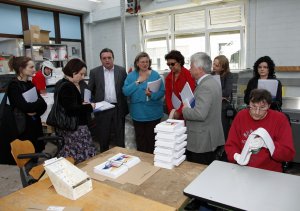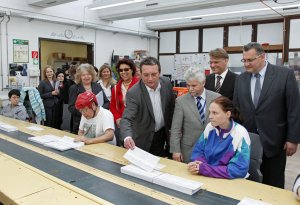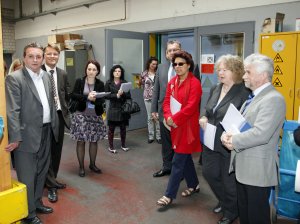Send Article to a Friend
Members of the European Parliament visited Workshop for Adapted Work
Several Members of the European Parliament followed the invitation of MEP Dieter-Lebrecht Koch and visited the Hanauerland Werkstätten in Kehl-Kork on 21 April 2010. Since these Members of the European Parliament have a work focus on Europe’s occupational and social policy, this visit was an excellent opportunity to receive first-hand information on German workshops for adapted work.
The Hanauerland Werkstätten are part of the Diakonie Kork. They offer work to 290 persons with disabilities in four workshops, located in Kork, Kehl and Kehl-Sundheim. They also provide therapeutical support for 160 and vocational training for 25 persons with disabilities.
While visiting the vocational training area, the work area and the day care centres, the Members of Parliament were given detailed information on the complex workshop services in Germany by Martin Lasch (Workshop Manager), Stephan Hirsch (Secretary General of BAG WfbM) and Ana Delp (European and International Affairs Expert of BAG WfbM). The MEPs became acquainted with the German concept of the workshop for adapted work as one possibility for vocational rehabilitation and participation in working life of mainly severely disabled persons. Workshop employees, together with their representatives of the workshop council and members of the staff answered questions raised by the politicians.
German workshops for adapted work are especially successful at integrating severely disabled persons into society through work. This is largely unknown in Europe. In other European countries, the persons occupied in institutions similar to German workshops, are not mainly persons with severe disabilities. In addition, the legal status of the disabled persons in workshop-like institutions in neighbour countries is that of an employee. In Germany, their status is an employee-like one, with all the rights of an employee, but without certain duties. This fact is also mostly unknown.
The Members of the European Parliament were interested in learning as much as possible on those aspects they concentrate on in their current work in Parliament and in their respective countries. For example, Melika Banarab-Attou, French MEP and Member of the Culture and Education Committee of the European Parliament, was mostly interested in the vocational training area. Jean Lambert from the United Kingdom wanted to find out as much as possible about the financing of the workshops. Milan Cabrnoch from the Czech Republic gathered information on the monthly remuneration of workshop employees. A television team from the Czech Republic accompanied him, to report on his commitment to improve the occupation of persons with disabilities in his country.
Picture 1: Workshop Manager Martin Lasch in conversation with Dr. Koch und Mrs Benarab-Attou, both MEP
Picture 2: The Members of the European Parliament are accompanied on their visit of the work area by Stephan Hirsch, General Secretary of BAG WfbM
Picture 3: Many new impressions and a lot of new information for the European politicians.
The Hanauerland Werkstätten are part of the Diakonie Kork. They offer work to 290 persons with disabilities in four workshops, located in Kork, Kehl and Kehl-Sundheim. They also provide therapeutical support for 160 and vocational training for 25 persons with disabilities.
While visiting the vocational training area, the work area and the day care centres, the Members of Parliament were given detailed information on the complex workshop services in Germany by Martin Lasch (Workshop Manager), Stephan Hirsch (Secretary General of BAG WfbM) and Ana Delp (European and International Affairs Expert of BAG WfbM). The MEPs became acquainted with the German concept of the workshop for adapted work as one possibility for vocational rehabilitation and participation in working life of mainly severely disabled persons. Workshop employees, together with their representatives of the workshop council and members of the staff answered questions raised by the politicians.
German workshops for adapted work are especially successful at integrating severely disabled persons into society through work. This is largely unknown in Europe. In other European countries, the persons occupied in institutions similar to German workshops, are not mainly persons with severe disabilities. In addition, the legal status of the disabled persons in workshop-like institutions in neighbour countries is that of an employee. In Germany, their status is an employee-like one, with all the rights of an employee, but without certain duties. This fact is also mostly unknown.
The Members of the European Parliament were interested in learning as much as possible on those aspects they concentrate on in their current work in Parliament and in their respective countries. For example, Melika Banarab-Attou, French MEP and Member of the Culture and Education Committee of the European Parliament, was mostly interested in the vocational training area. Jean Lambert from the United Kingdom wanted to find out as much as possible about the financing of the workshops. Milan Cabrnoch from the Czech Republic gathered information on the monthly remuneration of workshop employees. A television team from the Czech Republic accompanied him, to report on his commitment to improve the occupation of persons with disabilities in his country.
Picture 1: Workshop Manager Martin Lasch in conversation with Dr. Koch und Mrs Benarab-Attou, both MEP
Picture 2: The Members of the European Parliament are accompanied on their visit of the work area by Stephan Hirsch, General Secretary of BAG WfbM
Picture 3: Many new impressions and a lot of new information for the European politicians.































